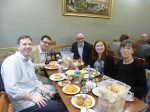Today at the Public Communication of Science and Technology conference we’ll be running a workshop on the use of social media channels to support engaged research. We’ll discuss the challenges and benefits of using social media as part of an engagement strategy, and consider the roles digitally engaged researchers adopt and the motives that drive their activities. Richard Holliman (standing in for Jamie Dorey), Ann Grand, Heather Doran and Ken Skeldon are bringing a set of example scenarios to discuss, along with related case studies that demonstrate how these challenges have been played out in practice. We’re hoping that this session will provide an opportunity to hear about the diverse experiences across the PCST community in order to consider effective practices in a range of contexts.
Resources
Abstract
This workshop will focus on how we use digital tools for public engagement with science and technology. Building on research findings from the Aberdeen and Open Universities’ Public Engagement with Research Catalyst projects, we will draw on the facilitators’ experiences in North America and Europe, and the workshop participants’ reflections on the role of digital technologies. We will explore the following questions: What are the challenges of using digital technologies to support engaged research with varied communities? What are the roles the digital researcher must fill? What motives underlie a commitment to digital engagement?
In recent years, the move towards engaged research has become more and more apparent, from the UK’s ‘impact agenda’ for research, the European Responsible Research and Innovation agenda, and more globally the drive towards ‘broader impacts’ that reach beyond pure commercial return. At the same time, digital technologies and social media are exerting an ever-increasing influence; researchers, science communication professionals, policy-makers and publics are increasingly using digital methods to communicate their research and engage with different stakeholder communities.
Participants will review a number of illustrative scenarios taken from a range of contexts where social media has been appropriated to support public engagement. These will include the discussion of controversial research issues, complex research, risk and the development of new ideas for digital engagement. In discussing these scenarios participants will consider the social, ethical and practical aspects of a number of public engagement approaches, and develop strategies for critically reviewing their individual, group, and institutional engagement practices.
There is huge opportunity for high-quality meaningful engagement through genuine dialogue via digital platforms, but in our experience one-way mass-communication has tended to prevail. In this session we want to draw on past experience to look at what we could achieve in the future.

